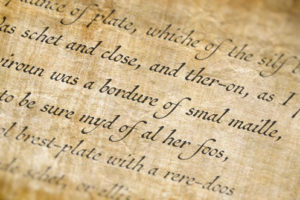I’ll answer the last part of that question first, no it probably doesn’t really matter depending on your audience. This is kind of a silly one, but some folks insist that it’s exclusively one way or the other, and while I personally prefer the pronunciation with a hard T, the answer probably depends on what language you’re speaking. Basci-NAY seems to be a very popular pronunciation among re-enactors (as has been my observation in the US and thanks to some friendly readers it has been brought to my attention that this wouldn’t even be the proper French pronunciation anyway), but why? Sometimes I think native English speakers, especially those who have no French experience, want to pronounce perceived French words that end in -et with an -ay sound. This more exotic sounding pronunciation is probably perceived to give it a more foreign and thus in some ways a more distant and medieval air (or that’s just how they learned it in the SCA 😉 ) But as in all things, I think it’s important we understand the why behind what we do, and I want to demonstrate that using a hard T is perfectly valid and backed up by sources (and generally the preference for academia).
In English sources, the bulk of the ‘-et armor words’ are Anglicized forms of French diminutives or corruptions of words from other languages that became part of the English language mostly during the use of Middle English, just like the word helmet which I think we can all agree should not be pronounced ‘helm-AY’. If you’re speaking English, shouldn’t you be using the English pronunciation? But what is that pronunciation? I was aware of a lot of circumstantial evidence that pointed to the hard T, but I’ve never seen a primary source that really showed it well. There are of course modern words used in English but said with a French pronunciation, like ‘filet’ in American English, but if you go to England you’ll probably here it pronounced ‘FIL-it’ so it all gets jumbled in the end.
Buried in the 1810 book Metrical Romances of the Thirteenth, Fourteenth, and Fifteenth Centuries: Published from Ancient Manuscripts1 there is a transcription of the text of the 14th century Romance Richard Coer de Lion (Richard the Lion Heart), in its original Middle English. The Middle English word bacynet appears a few times in the poem. If the spelling alone is not convincing that the ‘T’ should be spoken (since a lot of Medieval words vary in spelling, but are often written how they sounded), the clue to pronunciation comes from the fact that every pair of lines in the poem rhymes. Bacynet appears twice in rapid succession in one part of the poem, but more importantly it is the final position of the line in its second appearance and is used as a half of a rhyming pair.
“Togedyr when the hoostes mete,
The archeres myghte no more schete;
Men off armes the swedes outbrede;
Balles out of hoodes, soon they pleyde.
Swylke stokes they hem geve,
That helm and bacynet al to-reve,
That on the schuldre fel the brayn.
The Crystene men slowgh hem with mayn.
The foote folk and sympl knaves,
In hande they hente ful good staves;
Ther was no Sarezyn in that flok,
But, yiff that he hadde had a knok,
With a staff well i-sett
On helm, other on bacynet,
That he ne yede doun, sauns fayle,
Off hys hors, top on tayle.
Soone, withinne a lytyl stounde,
The moste party yede to grounde.”1
So unless they dropped the entire rhyming convention of the over 7,000 line poem, bacynet rhymes with -sett, and therefore, as used in Middle English, should be pronounced with a hard T in this instance. So I think it fair, that if you’re speaking English, when you say the word ‘bascinet’ or any of the other ‘-et’ armor words, you’re saying an English word, and should consider pronouncing it as such. I’m usually confronted with ‘But it’s a French word!” In reality, it’s also been an English word for 600+ years. When you take into account the Italian word for the bascinet, it is bacinetto in which case the T’s are not only pronounced, but emphasized as represented by the double consonant. The word has made it into several languages, each with their unique pronunciation. This is why I think it makes the most sense as an English speaker to use an English pronunciation of the word that’s been part of the English language since the Late Medieval period. In the end, who really cares as long as the meaning is mutually intelligible? But I thought some folks would find this interesting.
Source:
1. Ramsay, G. Metrical Romances of the Thirteenth, Fourteenth and Fifteenth Centuries. 1810. George Ramsay and Company.





4 Comments
Leave your reply.